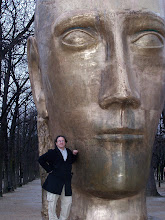Two familiar composers wrote the two pieces on this program. One piece, Tchaikovsky's Second Piano Concerto, is a major piece of music written by a perennially popular composer that has NEVER been played by the PSO. Tchaikovsky's first Piano Concerto has been wildly popular since it's premier over 135 years ago. It was savagely criticized by Nikolai Rubinstein, powerful Russian pianist and conservatory director. Then he began playing it when it became extremely popular. Tchaikovsky wanted him to play the second one (capitalizing on guilt?) but he died before that happened. However, he did render some mild criticism, that it was over long and episodic. I did this long winded intro because what interests me is that the second one seems more obviously open to stinging critique while the first is so obviously enjoyable.
The kicker here is that this long neglected piece, which is a mess, a wild, unbalanced, out of control, thoroughly enjoyable mess, was thoroughly enjoyed by the audience. And the audience was caught up in it enough they applauded after the first movement (shocking, I know). They gave it a huge ovation at the end of the piece. A big part of this is certainly that Stephen Hough brought it off with intensity, brilliance and flair. So why did it take 135 years to play this here. Other composers have written more than one piano concertos where one is wildly popular and still had the others played at least a bit. Ah the mysteries of show biz.
Another Russian, Sergei Prokofiev, wrote the piece on the second half of the program. Prokofiev's Fifth Symphony is one of seven and probably the best regarded. He is quoted as saying that it is "a symphony about the grandeur of the human spirit". It's hard to know what to say about something like that. The first movement opens quietly, builds, ebbs and flows and is a great example of the smooth, lyrical flowing Prokofiev. At least, for Prokofiev, the human spirit has some variety and lightness to it. Tortelier played with this variety well, building to a big climax by the end of the movement, the brass parts big, full and grand (the audience applauded again, twice in one evening, are the times changing?). The second movement, fleet, interwoven with lots of delicate touches. I love the clarinet parts as well as the prominent piano bits. This movement does remind me of the ballet composer Prokofiev without quoting himself directly. I don't know if this has been choreographed but I can picture the dancers in my head. While grandeur is not the word I would use for this movement, I am fine with the human spirit part. The long adagio third movement again places dancers in my head, now it is either Juliet or Cinderella in their thoughtful, wistful moments. The last movement starts with a quiet prelude that gives way to the opening theme which will also closes the movement. This theme is busy and propulsive. Lyricism returns in the middle of the movement though the frenetic figure is never far away. Among the many choices to make here, I was thinking about Tortelier's decision to emphasize intensity and the frenetic brilliance of the end of this movement. At one point, this repetitive figure takes over powerfully then most of the orchestra falls away until just a few instruments continue frantically. The orchestra wells up again for the big finish. It is an odd and distinctive end to the symphony. Tortelier and the orchestra brought this off with brilliance and intensity, quite impressive.
Prokofiev did write seven symphonies which makes him a serious 20th century symphonist. I especially like 1 and 5 through 7. However, I think of Prokofiev at his best in his ballet music and his concertos. I have long thought that he had not ever figured out symphonies despite his persistence. However, in discussing this with Herr Heine after the show, his take was that this was about Prokofiev's ambivalence about the form rather than a lack of skill. I like that.
Subscribe to:
Post Comments (Atom)

No comments:
Post a Comment